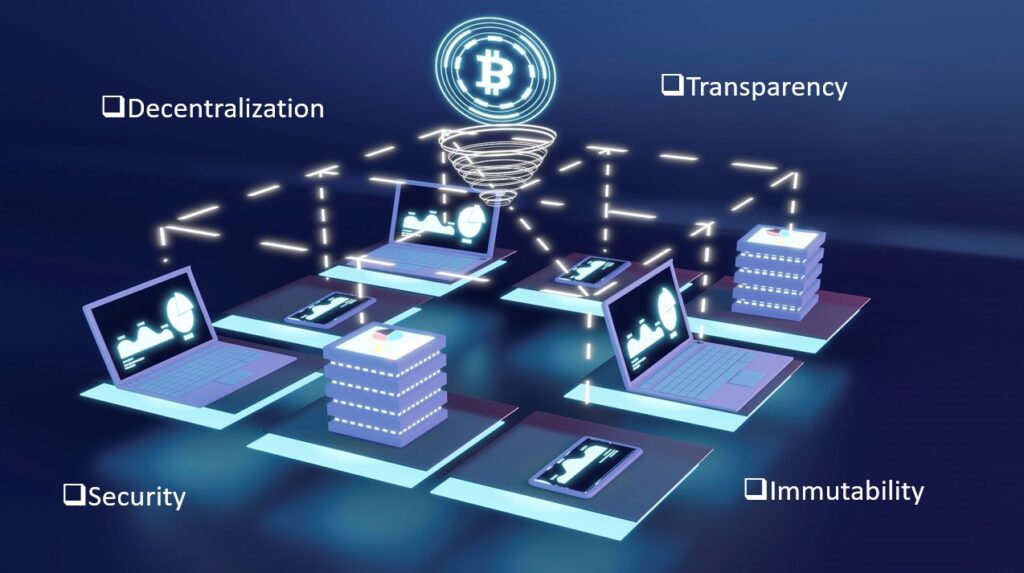
In the realm of emerging technologies, few innovations have generated as much excitement and potential as blockchain. Often referred to as the backbone of cryptocurrencies like Bitcoin, blockchain technology is poised to revolutionize various industries beyond finance. In this blog, we will delve into the world of blockchain, exploring its fundamental concepts, applications, and the transformative potential it holds for the future.
Understanding Blockchain
At its core, a blockchain is a decentralized and distributed ledger that records transactions across a network of computers. Unlike traditional centralized databases, where a single entity has control over the data, blockchain operates on a peer-to-peer network, ensuring transparency, security, and immutability.
Key Features of Blockchain:
- Decentralization: Blockchain networks are decentralized, meaning no single authority has complete control over the system. This reduces the risk of manipulation, censorship, or a single point of failure.
- Transparency: Every transaction recorded on the blockchain is visible to all participants in the network. This transparency fosters trust among users and helps prevent fraudulent activities.
- Security: Blockchain employs cryptographic techniques to secure data. Once a transaction is added to the blockchain, it is nearly impossible to alter or delete, making it highly resistant to fraud.
- Immutability: Once data is added to a blockchain, it becomes part of an unchangeable history. This property is especially valuable for applications where data integrity is critical, such as supply chain management and healthcare.

Blockchain Applications
- Cryptocurrencies: Bitcoin and other cryptocurrencies are perhaps the most well-known applications of blockchain technology. They enable secure, borderless, and peer-to-peer transactions, reducing the need for intermediaries like banks.
- Smart Contracts: Smart contracts are self-executing contracts with the terms of the agreement directly written into code. They automate processes and eliminate the need for intermediaries, reducing costs and increasing efficiency in various industries, including legal, real estate, and insurance.
- Supply Chain Management: Blockchain can provide end-to-end visibility into the supply chain, enabling companies to track the movement of goods and verify their authenticity. This is invaluable in reducing fraud, ensuring product quality, and improving traceability.
- Voting Systems: Blockchain can enhance the security and transparency of voting systems, potentially reducing election fraud and increasing public trust in the democratic process.
- Healthcare: Patient records can be securely stored on a blockchain, allowing for easy and secure sharing of medical data among healthcare providers while maintaining patient privacy.
- Intellectual Property: Artists and creators can use blockchain to timestamp and protect their intellectual property, ensuring fair compensation for their work.
Challenges and Future Prospects
While blockchain offers numerous benefits, it is not without its challenges. Some of these include scalability issues, energy consumption concerns (particularly for proof-of-work blockchains like Bitcoin), and regulatory uncertainties. However, ongoing research and development efforts are addressing these challenges.
The future of blockchain technology is promising. As scalability solutions are implemented, blockchain networks will become more efficient and capable of handling a broader range of applications. Moreover, as industries continue to explore its potential, blockchain will likely reshape the way we conduct business, govern, and interact in the digital age.
Conclusion
Blockchain technology is a revolutionary force that has the potential to transform various industries by enhancing transparency, security, and efficiency. Its applications extend far beyond cryptocurrencies, touching sectors such as supply chain management, healthcare, legal, and more. While it faces challenges, ongoing innovation and adoption will likely pave the way for a decentralized and transparent future powered by blockchain. As the technology evolves, its true potential may yet be unveiled, opening doors to new possibilities we can only begin to imagine.
Connect with us (kishore.kulkarni@nxtechworks.com) if you want to develop your Blockchain application.
All Images by freepik.com
